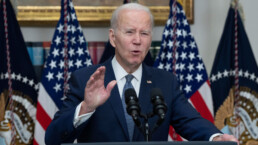by Jon Queally, Common Dreams
President Joe Biden delivered his first televised address from the Oval Office on Friday night to applaud the final result of legislative negotiations between his administration and Republicans in Congress who took the U.S. economy hostage over the debt ceiling, but progressive critics found the victory lap hard to take given the details of the deal and the devastating impacts they will have.
“It was critical to reach an agreement and it’s very good news for the American people,” Biden said during his remarks from the White House. “No one got everything they wanted but the American people got what they needed. We averted an economic crisis and an economic collapse.”

But what Biden called a “big win for our economy and the American people,” progressives—who argue the entire debt ceiling law is unconstitutional because it violates the 14th amendment and warned since last year that Republicans would orchestrate a crisis to protect wealthy tax dodgers and corporations while imposing fresh cuts on key social programs—should be seen for what it is: a kick in the face to the planet, democracy, and the material needs of poor and working-class Americans.
Warren Gunnels, majority staff director for the Senate Health, Education, Labor and Pensions (HELP) Committee chaired by Sen. Bernie Sanders (I-Vt.), said on social media Friday, the final legislation—which Biden is expected to sign into law Saturday—should be seen as “a big win for the donor class and a big loss for the 99%.”
“It’s nothing to brag about,” Gunnels added.
“Not everyone got what they wanted?” Nina Turner, former Ohio State Senator and congressional candidate, asked rhetorically. “The 1% and the military-industrial complex got exactly what they wanted.”
As Common Dreamsreported, Lockheed Martin CEO James Taiclet this week said Biden signing the agreement into law would be “as good an outcome as our industry or our company could ask for at this point,” noting that it calls for “3% growth for two years in defense where other areas of the budget are being reduced.”
Journalist and author Mark Jacobs suggested that much of the coverage in the corporate press has been friendly to Biden’s framing of the legislative result, but that this should be challenged.
“Here’s the news media’s takeaway on the debt ceiling deal: Yay! Bipartisanship works!” said Jacobs. “Here’s the reality: GOP radicals held the economy hostage, Democrats paid the ransom, and bipartisanship is badly broken.”
In addition to across-the-board spending caps for non-defense discretionary spending—which economists note is a real-world cut, given inflation, to key programs that serve tens of millions working class individuals and families—the deal greenlit permitting reforms for oil and gas projects desired by the fossil fuel industry and will force fast-track approval of the controversial Mountain Valley Pipeline that frontline communities in West Virginia, Virginia, and elsewhere have opposed for years.
Katie Bergh and Dottie Rosebaum, policy analysts with the Center on Budget and Policy Priorities, detailed this week how changes to the Supplemental Nutrition Assistance Program (SNAP) contained in the deal championed by Biden and Speaker of the House Kevin McCarthy “would put almost 750,000 older adults aged 50-54 at risk of losing food assistance through an expansion of the existing, failed SNAP work-reporting requirement.”
“The older adults who lose access to SNAP would lose about $8 per person per day in benefits,” explained Bergh and Rosenbaum. “These individuals often have very low incomes, and the loss of SNAP will push most of those affected into or deeper into poverty.”
At the same time, the deal championed as a “big win” included large cuts to the IRS budget that a CBO analysis this week showed will actually cost the federal government over $40 billion in lost revenue and increase the deficit—the opposite result of what the GOP claims regarding the budget but very much in line with helping wealthy tax dodgers and corporations pay less each year.
In a Friday op-ed explaining his opposition to the legislation, Sen. Sanders said the only thing good to say about the bill was that it was not worse—which it certainly could have been.
“At a time when this country is rapidly moving toward Oligarchy, with more wealth and income inequality than we’ve ever experienced, I could not in good conscience vote for a bill that cuts programs for the most vulnerable while refusing to ask billionaires to pay a penny more in taxes,” Sanders wrote. “Wall Street and corporate interests may be enthusiastic about this bill, but I believe it moves us in exactly the wrong direction.”
“The fact of the matter is that this bill was totally unnecessary,” Sanders concluded in his op-ed. “The President has the authority and the ability to eliminate the debt ceiling today by invoking the 14th Amendment. I look forward to the day when he exercises this authority and puts an end, once and for all, to the outrageous actions of the extreme right-wing to hold our entire economy hostage in order to protect their corporate sponsors.”
Recent Posts
‘Unconstitutional. Unethical. Authoritarian.’ ICE Bars Millions Of Immigrants From Bond Hearings
July 18, 2025
Take Action Now One watchdog said the new policy “seems like a blatant attempt to stop them from exercising their right to due process.”……
Americans Are Not Nearly Alarmed Enough About Climate Change
July 18, 2025
Take Action Now Americans still don’t comprehend how imminent, dangerous, and far-reaching the threat is—and journalists are partly to blame.By…
The IRS Is Building A Vast System To Share Millions Of Taxpayers’ Data With ICE
July 17, 2025
Take Action Now ProPublica has obtained the blueprint for the Trump administration’s unprecedented plan to turn over IRS records to Homeland Security…
Israel’s Sudden Assault On Syria Is Unchecked Aggression
July 17, 2025
Take Action Now Jerusalem is bombing Damascus and threatening al-Sharaa’s rule, while Washington was hoping to help the nascent government on…




